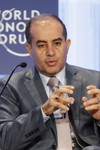| |||||||||||||||||||||||||||||||||||||||||||||||||||||||||||||||||||||
200 seats in the General National Congress (80 seats for political parties, 120 for individual candidates) 101 seats needed for a majority | |||||||||||||||||||||||||||||||||||||||||||||||||||||||||||||||||||||
|---|---|---|---|---|---|---|---|---|---|---|---|---|---|---|---|---|---|---|---|---|---|---|---|---|---|---|---|---|---|---|---|---|---|---|---|---|---|---|---|---|---|---|---|---|---|---|---|---|---|---|---|---|---|---|---|---|---|---|---|---|---|---|---|---|---|---|---|---|---|
| |||||||||||||||||||||||||||||||||||||||||||||||||||||||||||||||||||||
 | |||||||||||||||||||||||||||||||||||||||||||||||||||||||||||||||||||||
| |||||||||||||||||||||||||||||||||||||||||||||||||||||||||||||||||||||
 |
|---|
|
|
|
|
Elections for a General National Congress (GNC)[1] were held in Libya on 7 July 2012, having been postponed from 19 June.[2][3][4] They were the first elections since the overthrow and death of longtime ruler Muammar Gaddafi a year earlier, the first free national elections since 1952,[4] and only the second free national elections since Libya gained independence in 1951.
Once elected, the General National Congress was to appoint a Prime Minister and Cabinet.[5] The GNC was originally to be charged with appointing a Constituent Assembly to draw up Libya's new constitution in an interim period of 18–22 months before a constitutional referendum and new elections on that basis, but the National Transitional Council (NTC) announced on 5 July that the Assembly would instead be directly elected at a later date.[4]
Despite threats of a boycott, a majority of Libyans (61.58%)[6] cast a ballot. However, the election was marred by violence, protests and a number of deaths.[7][8]
- ^ "Q&A: Libya's General National Congress election", BBC News, 7 July 2012, archived from the original on 5 July 2012, retrieved 20 June 2018
- ^ "Libya elections postponed to July 7". gulfnews.com. 11 June 2012. Retrieved 29 August 2024.
- ^ "Libya: Transitional authorities to hold election 19 June", AfriqueJet, 28 April 2012, archived from the original on 7 May 2012, retrieved 1 May 2012
- ^ a b c Gumuchian, Marie-Louise, and Hadeel Al Shalchi. "Libyans celebrate free vote despite violence". Reuters. Archived from the original on 9 July 2012. Retrieved 8 July 2012.
{{cite news}}: CS1 maint: multiple names: authors list (link) - ^ Cite error: The named reference
BBC2was invoked but never defined (see the help page). - ^ "National Congress party results -". www.libyaherald.com. Archived from the original on 23 May 2019. Retrieved 20 July 2014.
- ^ "Boycott calls and unrest raise fear of violence on eve of Libya's first election". 6 July 2012. Archived from the original on 26 July 2014. Retrieved 18 July 2014.
- ^ "Libyan militia storm election office in Benghazi as violence spreads". The Guardian. Associated Press. 1 July 2012. Archived from the original on 10 May 2017. Retrieved 12 December 2016.



